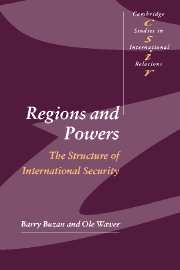Book contents
- Frontmatter
- Contents
- List of illustrations
- Preface
- List of abbreviations
- 1 Patterns of regional security during the Cold War
- 2 Patterns of regional security post-Cold War
- Part I Introduction: developing a regional approach to global security
- Part II Asia
- Part III The Middle East and Africa
- Introduction
- 7 The Middle East: a perennial conflict formation
- 8 Sub-Saharan Africa: security dynamics in a setting of weak and failed states
- Conclusions
- Part IV The Americas
- Part V The Europes
- Part VI Conclusions
- Glossary
- References
- News media
- Index of names
- General Index
- CAMBRIDGE STUDIES IN INTERNATIONAL RELATIONS
Introduction
Published online by Cambridge University Press: 05 December 2009
- Frontmatter
- Contents
- List of illustrations
- Preface
- List of abbreviations
- 1 Patterns of regional security during the Cold War
- 2 Patterns of regional security post-Cold War
- Part I Introduction: developing a regional approach to global security
- Part II Asia
- Part III The Middle East and Africa
- Introduction
- 7 The Middle East: a perennial conflict formation
- 8 Sub-Saharan Africa: security dynamics in a setting of weak and failed states
- Conclusions
- Part IV The Americas
- Part V The Europes
- Part VI Conclusions
- Glossary
- References
- News media
- Index of names
- General Index
- CAMBRIDGE STUDIES IN INTERNATIONAL RELATIONS
Summary
Africa and the Middle East are traditionally linked by trade (including the slave trade) and religion (the spread of Islam) stretching back to the seventh century ad (Deegan 1996: 7–27). More relevant to our theme of regional security is that they share a long and ambiguous boundary through the Sahara across which there is significant security interaction. Both share the experience of decolonisation, with the consequence that many of them are shallow-rooted weak states. But this simply makes them part of a wider third world. A more interesting parallel is that both started their post-independence life equipped with pan-regional identity movements: pan-Africanism in Africa and pan-Arabism and pan-Islamism in the Middle East. There was substantial geographical overlap in these movements, most obviously in North Africa. But their main importance was the challenge they raised to the viability of a postcolonial state system based on national identity and sovereignty.
Into this brew of an imposed Westphalian system and pan-regional identities one has to add Krause's (1996: 324–7, 335–42) idea that many postcolonial states escaped from the European process of state development sketched out by Tilly (1990; also Howard 1976) in which the demands of military competition and war fed back into the creation of bureaucratic, then national, and finally democratic states. In this model, the state needed to raise revenue by taxing its population, which gave it an interest in economic development and required it to develop ways of relating to its population in a long-term and stable manner.
- Type
- Chapter
- Information
- Regions and PowersThe Structure of International Security, pp. 185 - 186Publisher: Cambridge University PressPrint publication year: 2003



